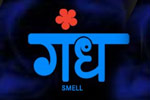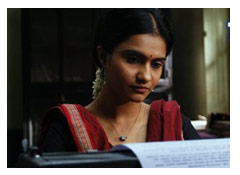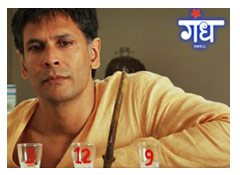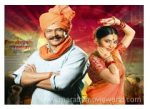GANDHA REVIEW
 |
Rating: na
Presenter: Flashbulb Ventures Producers: Pritam Bhandari, Rajesh Goyal, Sandeep Kankariya Director: Sachin Kundalkar Camera: Amalendu Chowdhari Music: Shailendra Barve Cast: Milind Soman, Sonali Kulkarni, Neena Kulkarni, Amruta Subhash.. Movie Review by: Saurabh Karni |
Marathi Theater is known for new experiments and the new generation entering in the Marathi film industry is closely associated with Theater. Films and Theater has its own advantages and disadvantages. Yes, combination of both would definitely enrich the feel of the movies only if the combination of both mediums is perfect. And that’s what Sachin Kundalkar made with ‘Gandha’ and took the movie at different level and makes it ‘great’ rather than a ‘good’ movie.
The movie has combination of three stories. There is no interconnection as such in the stories but at the end even a common viewer can connect the stories. Prospective toward movie can differ from person to person but each and everyone can definitely connect himself with the film.
First story – ‘Lagnachya vayachi mulgi’ starts with a light comedy mood. Veena (Amruta Subhash) waiting to be a bride (infact her parents in hurry to see her in bridal get up), her dreams (sometimes sound ‘typical’), little expectations from her life partner, her ‘Puneri’ parents, traditional ‘Dakhavne’ or ‘Kande-Pohe’ program and so on is presented. She finds her dream partner in a student of art school – Girish Kulkarni where she works as a clerk. Then her feelings, attraction, realization between dream and reality are put across amazingly.
Second story – ‘Aushadhe ghenaaraa maanus’ is based upon a modern relationship. Sarang (Milind Soman) is a HIV positive person.
Her wife Raavee (Sonali Kulkarni) who had left him long time ago visits Sarang’s place and the story moves forward through their conversation. Various incidences of their past life, relationship comes as references.
Third story – ‘Bajula Basleli Bai’ is presented with background of Kokan with a bit feministic approach. Jaanaki (Nina Kulkarni)- a typical wife and daughter in law of middle class Marathi family doesn’t have any child even after many years of marriage. Her husband’s sister is pregnant and came for the delivery. Unfortunately Jaanaki couldn’t help at all as it is not allowed to her during ‘those days.’ Though the story has lots of feministic approaches, it has presented in entirely different manner. It not only shows her sorrows but also explains her importance at her home, what so ever.
The movie has huge starcast including Sonali Kulkarni, Amruta Subhash, Nina Kulkarni, Milind Soman, Jyoti Subhash and many others. Each and everybody have played character beautifully. Every character of the story has it’s own features, nature, emotions and that sounds perfectly natural. We could feel that every character can be find around us in real world.

Director has skillfully used more facial expressions than words and every expression takes the story forward. Sonali is great as usual. Nina Kulkarni’s acting is haunting, as usual. Jyoti Subhash, Girish Kulkarni have supported the movie perfectly. Milind Soman’s first
ever experience in Marathi film is pleasant. Amruta Subahs’s acting sound effective but a bit monotonous. Audiences are so used to her ‘typical’ expressions (especially smile) that most of the times they could easily predict her expressions.
I would give 110 out of 100 to Sachin Kundalkar as a director. I have no words to admire him. As the name ‘Gandha’ suggests various things like ‘Balantinichi kholi’, flowers (particularly Sonchafa), perfumes, rain, ‘gandha’ of love and anger, ‘gandha’ of body are used skillfully in the movie. Sachin Kundalkar has transformed himself from the theater to film and he has amazingly combined plus points of both mediums. Theatrical language used so marvelously in the movie that we could feel live ness of the film just like theater. Use of space is always a plus point of Sachin’s plays and he has deliberately used extremely efficiently in the movie. conjested place of Puneri Peths, different diemetters of Wada at Kokan, modern home is used remarkably well. The spaces also make comments over the spaces between different relations.
The movie moves forward with expressions, music and different sounds rather than dialogues. Various forms of music have been used quiet effectively and logically. Credit must be given to Shailendra Barve and Anmol Bhave. Shailendra Mehetre has enriched the flavor of the movie with his cinematography. Abhijit deshpande’s performance as an editor is remarkable.

Like love, anger, sorrow, joy, ‘Gandha’ is undetectable part of our life. We feel it in our life while first rain, romance, flower, newly born baby and with many other examples. But do we really notice it? Admire it? Like love, meaning of ‘Gandha’ changes person-to-person, situation-to-situation, age-to-age, and context-to-context and that has been superbly presented through the movie. Someone cannot find any connection in three stories or someone can find several. Everybody would describe the movie as per his/her experiences. But the fact of the matter is the movie relates each and every audience, irrespective of prospective and that is the real success of the movie



